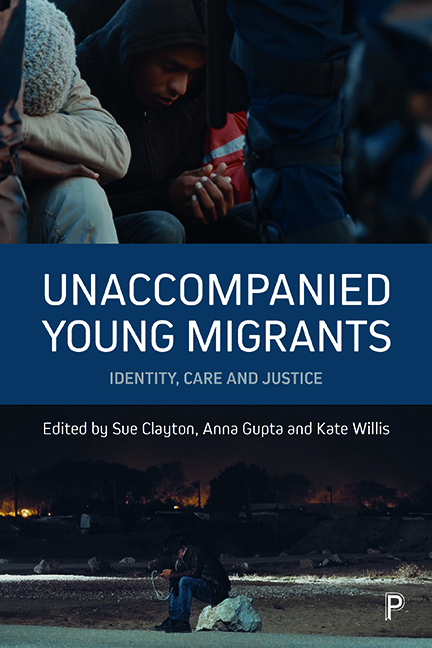Preface: Voices of separated migrant youth
Published online by Cambridge University Press: 21 April 2022
Summary
Sue Clayton worked with separated refugee youths between 2006 and 2017 as a filmmaker and academic, and more recently as a consultant for the BBC, ITV News and Channel 4 News. She has interviewed over 200 young refugees and is developing a website (www.bigjourneys.org) to archive them. These stories are told in the way the young people wished to tell them. Her subjects have been anonymised for reasons of privacy. Together they present a collective picture of typical life journeys – hopes, fears and aspirations – which can be read to inform and inflect the chapters that follow. Our thanks to the young people for sharing their testimony.
Life back home
Y, 15, from Eritrea, talks about his family
‘My father died when I was small and so it was just me, my mother and my older brother. Then my brother was conscripted to the army, and in my country that means you belong for life and you must never say anything bad about the government. And we did not know where he is because everything is secret. It was just me and my mum.
‘When I was 12 my mum got the money to send me to Asmara, the capital, to go to school there. I was sad not to see her but I tried to focus on my studies. Then when I was 14 she said: “Soon it will be time when they will make you join the army, and you will have to prove you are loyal like your brother did, by killing people from round here, from the place that you know. They keep asking me where are you? And I am afraid.”
‘My mum was able to get the money from my uncle, and the uncle said “You have to start your journey, and there is another boy going, you go with him.” I cried and said no. My uncle said, “You must do this, it is what your mother wants.” I thought “I am too young to be doing this on my own. And I will not see my mother again.”’
A, from Afghanistan, describes his family being broken up when he was 14
‘The Taliban was after my family because my father had a connection to the British Army. He had been a driver.
- Type
- Chapter
- Information
- Unaccompanied Young MigrantsIdentity, Care and Justice, pp. 105 - 114Publisher: Bristol University PressPrint publication year: 2019

